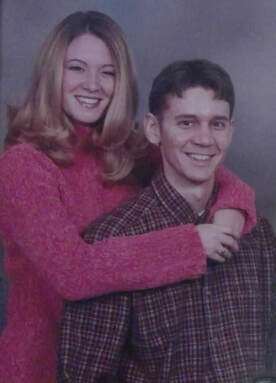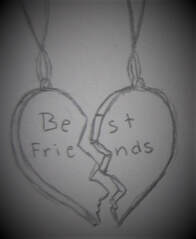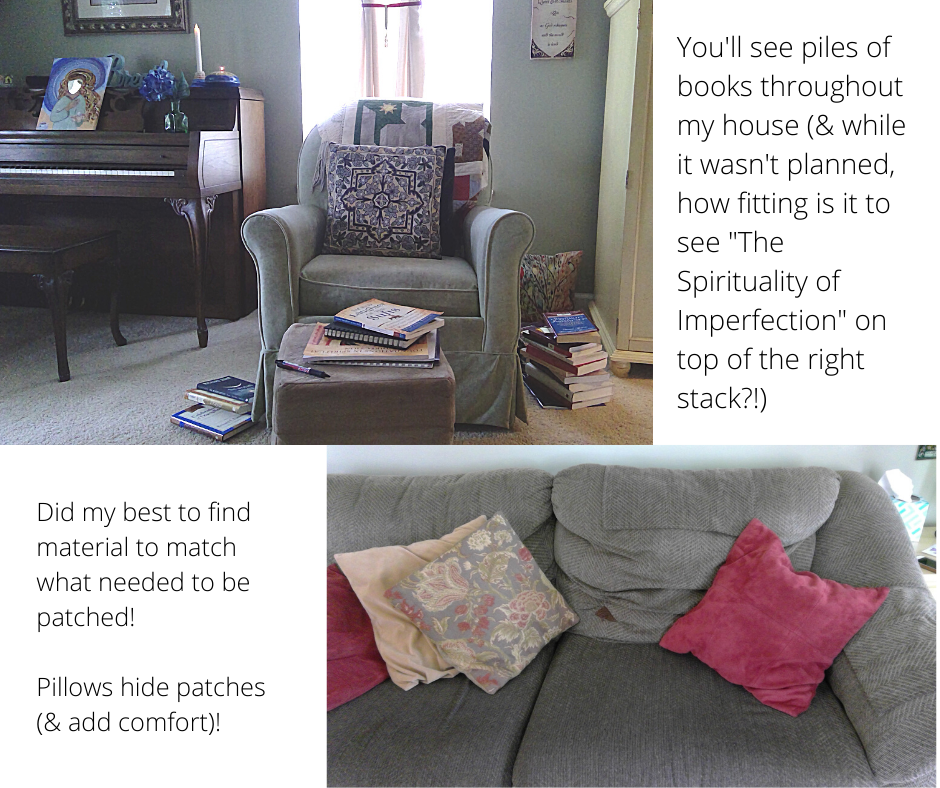|
Mine is the piecemeal house
with patched couch peeling and cracked cabinets broken back-slat chairs Clutter made up of books, boxes, and bags of papers, poetry, and prayers. -My Piecemeal House, Kasey Hitt, 2021 One day I got caught up in the comparison game and found myself on the losing side. Comparison games are anxiety-causing no matter what side you're on and being on the losing side most often leads to feelings of shame. So to get my feelings out rather than get stuck in them, I scribbled down this poem. The last line surprised me as it invited a shift. It was a call to come home to a value and spiritual practice I appreciate but can often lose sight of: Simplicity. On Sunday, my husband played the old Shaker song on the piano, “Tis the Gift to Be Simple” (aka "Simple Gifts"). The rest of us sang. We started having fun with it by playing multiple versions on Amazon Music—fast and slow tempos, lyrics and instrumentals, solo singers and choirs, brass, dulcimer, and piano versions… We stopped once we got sick of the song! However, listening to it over and over helped us hear, meditate, and move with it so the message could go from head to heart. 'Tis the gift to be simple, ’tis the gift to be free 'Tis the gift to come down where we ought to be, And when we find ourselves in the place just right, 'Twill be in the valley of love and delight. When true simplicity is gained, To bow and to bend we shan’t be ashamed, To turn, turn will be our delight, Till by turning, turning we come ’round right. When I revisited my poem, I saw how the words started with my feelings of shame as I described some worn-out parts of my house. It ended with words that led me deeper into the soul(s) residing there. A spontaneous smile and warmth replaced the shame. And right here in my house, just as it is, in a neighborhood with “valley” in its name, I discovered love and delight. ______________________
 Kasey & Russ in early 2001. Kasey & Russ in early 2001. Trembling and bewildered, the women went out and fled from the tomb. They said nothing to anyone, because they were afraid. Mark 16:8 (NIV) Sometimes our reaction to resurrection isn’t joy. Sometimes it’s trembling and bewilderment (or as the NRSV translation says “terror and amazement”). This Easter, my family of four paused at this ending of the book of Mark before continuing on with the two endings that were added later on. My teen daughter jokingly calls the latter the “fan fiction endings” (alternate endings or additional info added by those who love the story rather than the original author). She is a reader of fan fiction when it comes to her favorite novels. Clearly the women's fear and silence was not the end of the story given how it unfolded in the other Gospels and in the book of Acts, but the earliest manuscripts stop at verse 8. And it got us wondering how many times in our own stories has God presented us with resurrection and we’ve been too scared out of our minds to accept it (let alone tell anyone!). This might be resurrection in the form of a new dream, calling, or relationship arising just when we thought all hope was dead and gone. Maybe this has happened to you (or is happening to you) and instead of joy, your first response is trembling, bewilderment, and keeping it to yourself. Why? Why might terror and amazement be our first reaction to the reality of resurrection? It doesn’t fit our storyline. We’re not expecting it. The women were expecting to see Jesus’ body, that’s what they were prepared for. Their biggest challenge was how they would roll the stone away, that’s the story they were prepared for. They were utterly unprepared for this. Years ago, my husband had just broken off an engagement. He told God he was ready to be a lifelong bachelor, then less than two months later, I came along…terror and amazement. We don’t want to let go of our old storyline. If we let go of what is familiar (even if it’s painful), what might that mean? What might others think if something is voiced that is out-of-the-norm, completely other than what is expected? They were just ordinary women going about their plan to anoint their loved one’s dead body. Nothing out-of-the-ordinary. Now they are told to be evangelists! Women sharing the Good News with men—of the risen Christ—not so easy, definitely tremble-worthy. In Russ’ hidden handbook of dating, two months was not enough time in between relationships. What might others think? Could he let go of what others (and even a part of himself) thought? The new storyline seems too good to be true. Who wouldn’t want to hear that their loved one has been raised from the dead?! Sometimes when something is beyond our own imagining, it triggers all of our insecurities and fears. Given women’s role in society, perhaps the women that early morning felt especially vulnerable in sharing such news. Would they be believed and if not, what then? Could they bear being mocked and belittled? Entering into another relationship for Russ, meant entering into another possibility of exhausting dysfunction, hurt, and rejection. Staying to himself seemed easier, but after our first conversation, he could not resist the feeling of hope for a healthy relationship. He had to decide if stepping out of hiding was worth the risk and ridicule. He decided to take the risk that comes with resurrection. After learning I had just had my wisdom teeth out, he walked up to me after a church service (he played in the worship band and I was the youth pastor) and asked how I felt after the surgery. Awkward? Yes. Did it trigger not only his, but all of my own insecurities? Yes. But, we will have been married for twenty years this October. As I write this, I’m staring into the face of another resurrection. It has come while I have not yet totally released my grief and attachments to the old, dying storyline (what, how & who I had planned on being part of the unfolding of a dream I had pictured over fifteen years ago). Much like Russ experienced twenty-one years ago, God has raised up a new dream before I have felt ready, causing much trembling and bewilderment! And like the women that morning, I have been afraid. I have needed time to ponder whether or not the eyes of my heart have been deceiving me. And I have needed to further loosen my grasp on the old while becoming aware of what has been triggered in me so as to open my hands and give my heart to the new. As the Spirit of God gives me courage, I share the good news of this new dream with others. And I imagine it will spread soon enough (as good news eventually does!). _________________________________ When resurrection happens may your eyes be open to see it. And may the terror and amazement lead not to shame but to solitude with the God who raises the dead and to community with spiritual companions who can give you courage. May you trust that you will not remain afraid forever, but step boldly, no matter how clumsily, into the truth revealed by the resurrected Christ.  Finding yourself triggered more than usual with thoughts and feelings of rage, resentment, and judgment? I know I am. And it's not just toward others (we'll focus on that next week)! What are we to do with inner voices of critique and judgment, chronic dissatisfaction and frustration? How do we not let ourselves be beat up by them? Is there another way? Jesus once summed up the entire Scriptures by saying, “'Love the Lord your God with all your heart and with all your soul and with all your mind.' This is the first and greatest commandment. And the second is like it: ‘Love your neighbor as yourself.’” (Matthew 22:37-38) “Loving your neighbor as yourself” is to “loving the Lord your God,” as the moon is to the sun. The former reflects the latter. Like the line from his prayer to the Father, “Thy Kingdom come, Thy will be done, on earth as it is in heaven,“ Jesus teaches and prays for wholeness—inner and outer continuity, authenticity, alignment. Oneness with God, self, and neighbor. “Loving yourself” is inextricably linked to “loving your neighbor.” Think of those best friends necklaces with two halves, both are needed to make the heart whole. So let's begin with our part--ourselves. Tell me, how are you loving yourself these days? How would you characterize your inner conversations? Are they best friends necklace worthy? Is your inner landscape characterized by harmony and peace? What/who is your inner world reflecting? Given I resonate with a One on the Enneagram, inner critique and compulsive improvement of myself (& others) along with their counterparts of rage and resentment are easily accessible. They are often lurking, looking to supplant the inner voice of Love. When that happens, I cannot relax so compulsive doing is often the result (and a red flag). Recently, someone brought up a class series I taught a while ago and said that what continues to stick with her most was how I started every class with the invitation to be curious. I usually write these three phrases at the top of the dry erase board or handout: “Be curious. Be compassionate. Be aware” Given the subject matter is designed to go deeper, I know most classes will challenge our surface-level survival self (our ego). In response, people can expect to experience resistance (and all manner of feelings). That's not bad. There's wisdom in the resistance if we look. Given what we're presented with on a daily basis right now, there's plenty of subject matter to challenge our survival selves, isn't there?! At any moment, fear may be triggered, or anxiety, anger, resentment, rage, envy, sadness, guilt, shame, even numbness and avoidance. Instead of harmonious, our inner world begins to look like a daily war zone where there isn't the space or ability to give and receive love since it's all about surviving the day. What can bring peace to the inner chaos? Certainly not more "shoulds"! Fortunately, God offers us paths of peace. One that I've found is choosing curiosity over critique. It almost immediately relaxes inner tension, opening me to the inner voice of Love. Remember, it was Moses’ curiosity that caused him to stop what he was doing and take a closer look at the burning bush. From inside the fire, the Voice of Love spoke to him. Try it. Be curious.
Once becoming aware of the tone, physical sensations, and triggers, then the next time you experience them, rather than continuing down the path of self-condemnation which can lead to inward or outward lashing out, pause. Turn your compassionate gaze toward that inner burning (or numbness) and be curious:
Let's play with this concept of curiosity with ourselves. Next week we'll consider curiosity with others.  Who are you not being or what are you not doing because you fear how you will appear in the eyes of others? What reputation are you trying to uphold? I've spent tons of energy on my good, Christian girl image for as long as I can remember. And being in ministry my whole adult life has not provided relief. At times, this has intensified the inner critic that reminds me that I have a reputation as a Christian leader and spiritual guide to uphold. Quite frankly, I've given way too much thought as to how things like changing my theological stances to not-every-Sunday-church-attendance affect my reputation (case in point, I just gave way too much thought in writing this sentence!). I have often chosen rule-following over following my heart. And the many times I have boldly followed the still, small voice within, my inner critic who abides there as well, has often stolen, killed, and destroyed the freedom found in the following. Fearing outer criticism causes such unnecessary inner turmoil! Some say we begin to care what other people think in middle school. My daughter started middle school this year. She told my husband and I that she wanted us both to be at the bus stop with her. I thought after the first day or two she would probably like us to remain at a safe distance. I was wrong. She wants us there everyday and even wants a hug before she climbs into the bus! Part of me loves this. And I have to admit, even though she feels not a hint of embarrassment, a part of me feels a twinge of it for her as I see the other middle schoolers looking out the window of a full bus. Maybe I'm feeling over-protective (if she won't protect her image, I will!) or maybe it's the middle school girl in me still caring what others think. Why risk it? One morning last week I sat at the kitchen table after an all-night headache with little sleep. I told her, "Your dad will have to go with you to the bus stop, I don't think you'll want me along." She said, "Why not?" I said, "Look at me, I'm still in my pajamas!" She replied, "You had a hard night, of course you are, but I don't care, it's not like I have a reputation I need to defend!" I looked at her bewildered. Have I ever not thought I had a reputation I needed to defend?! Then I held up my hand and said, "You need a high-five because you'll be good to go if you can keep that sentiment through middle school." She laughed. Oh the freedom to authentically be who you are and do what your heart desires no matter what others think! We both walked her to the bus stop (although I did change out of my pajamas). After she climbed on the bus, I looked at my husband and said, "Who is that child?" Then I told him how her response immediately ambushed my weary heart, speaking into my own life of places where I've been overly concerned about how I appear in the eyes of others. If a middle school girl can wholeheartedly choose what is inside over what others think of her on the outside, then perhaps I can, too. Oh the freedom! God knows it's time. By the way, the next morning she pointed to us and said, "I may not have a reputation to defend, but let's not do this again!" We had unknowingly put on matching t-shirts to walk her to the bus stop! I appreciated her authenticity. Both of us cringed as the bus drove past.  More than I thought. In 2009 I had emergency back surgery for a ruptured disc that caused the worst nerve pain I have ever felt...paralyzing lightning down my leg and out my right toes leaving me screaming. After the surgery, I'd hoped the muscle pain and sciatica I had experienced on and off since high school would finally be gone...it wasn't. I did physical therapy (having already done chiropractic). Again I was hopeful...it didn't help. Whenever the pain would hit, I'd chalk it up to accidentally bending or twisting and tweaking an old basketball injury. It would have me either in bed or on the floor with my feet up on the couch for days. I thought my active life of hiking and carrying stuff (like my own little girl) was over. I (& those around me) started treating my back gingerly, making sure I did not lift or do anything that could trigger that familiar shooting pain. You can imagine what I looked like whenever I walked and sat down or did anything that included my back (amazing how much does!). One night at a breathwork class, after observing me, the instructor told me to read John Sarno's The Mindbody Prescription, saying it would help. I thought this was laughable. I'd undergone the knife and physical therapy, how could a book help? Undeterred she told me how it had helped a friend with my kind of pain. At the end of our time she said, "You're so young, I just don't want you to be in pain the rest of your life." What did I have to lose? I read it. I haven't been on the floor or in bed due to back pain since. Seriously. That was 8 years ago! Over the past eight years, beginning with that book, I've learned three things: My physical self is interconnected with all other parts of myself. How I am spiritually affects how I am emotionally which affects how I am physically and all can affect how I am relationally. What's happening relationally can affect how I am mentally and emotionally and physically and so on. If we choose to dissect and isolate any of these when we have dis-ease or pain in any given area, we miss ways of healing that come when we consider the whole of us. A lifetime of being a "good girl" coupled with perfectionism affected my body. It led to the suppression of anger and other unwanted feelings which finally erupted in physical pain. My unconscious thought physical pain a better choice than emotional pain. Locating an old area of injury and a socially acceptable place of pain (back pain is what ulcers used to be!), that's what it chose. It's interesting the games our minds can play (thinking that they're helping us)! Seeing God as a Divine Task-Master perpetuated my good girl-perfectionist cycle. Since we become like the God we adore (as I mentioned in last week's post), my inner critics had no problem replicating this God-like perpetual drivenness to accomplish and improve. Be better. Try harder. Be (or at least act) perfect. And it's no surprise that snippets of Scripture would often run through my mind to back up these "commands"! Anytime I fell short, which of course I did since I'm human, I took the feelings of anger and shame and stuffed them. Eventually my body would no longer "play these reindeer games" (it began warning me in junior high but it took me a long time before I would or knew how to listen!). Now my body is my friend. I view it as part of the whole. It tells me the truth. When I feel nerve pain begin in my toe, I know that if I don't tend to what feelings are running under the surface, it will soon start in my back. My God-created body has invited me to not only reflect on my God-created emotions but even my image of God. As my image of God has undergone healing and transformation, guess what? It's affected my mind, emotions, relationships, and yes, my body. Thank God for that gift of back pain.  Sitting around a campfire years ago, I led a group of seminarians and professors in a time of silence. Afterwards, one of the professors shared that not long into the quiet she began to smell something unsavory. After a few moments, she realized the smell was body odor and a moment later realized it was her own! Her first response was shame. Since it was at the beginning of our time she decided that rather than get up and leave, she would sit with her shame and her body odor in the holy silence. And slowly she began to feel the love of God envelop her and speak lovingly to her from within herself. Within minutes she went from shame to accepting and even appreciating her humanity. This is the humanity the Son of God entered long ago. Although we clean up the site of Jesus' birth in story and song, the reality is he was born in a barn of some sort. He was born to parents who had been on a long, dusty journey. And if you've ever been present at a birth, you know it's not neat and tidy. Consider those smells. You could say the site and smell of his birth was as shameful as the site and smell of his death. As an adult, Jesus continued to enter deeply into humanity even using dirt (humus) and spit to heal. What some may consider gross he transformed into a means of grace. Maybe Jesus was telling us something about being human. You don't need to be ashamed. Shame is a lonely place, it has been from the beginning (just ask Adam & Eve or the professor sitting at the campfire!). Jesus' own lineage, his family tree, was marked by shame--adultery, incest, prostitution and murder (as well as people who did little to make a name for themselves, good or bad)! Yet it is here, from and among the lonely, shameful places and people that Jesus was born, lived and died. What do we make of this? Clearly God is up to something. This story has something to say. Here is a God who from the moment humanity felt shame and hid, entered in with words and care (Genesis 3). Then when they came out of hiding, offered them the hard work of love as the pathway to transformation. The Incarnation, this Word becoming flesh in Jesus, reiterates and provides an exclamation point--it's into our shame where God chooses to come and again offers transforming love. Had she not noticed her body odor and allowed God into her shame, the professor may have missed the Holy Voice speaking words of love to her. She could have missed the Beloved leading her to accepting and appreciating her own humanity (which then overflows into accepting and appreciating the humanity of others). Yes, Christmas is full of good smells (fresh pine, cinnamon, gingerbread, peppermint and orange) and we can certainly celebrate those. But what if we miss the message of the manger because we're overly focused on the savory? What are the unsavory parts of the season? Where are you most experiencing shame and loneliness in your life right now? In other words, what or where are you hiding? Perhaps if we come out of hiding and acknowlege what "stinks" we may witness anew the Christ who was born in an ancient barn and laid in a manger. Jesus is the face of God, the One who comes to us right in our humanity (especially there) with Good News, transforming our stench into an aroma pleasing to the Lord. Breathe deep! |
AuthorKasey is a scarf, ball and club juggling spiritual director just outside of Nashville, TN. Play helps her Type-A, Enneagram 1 personality relax, creating space for poetry and other words to emerge. She also likes playing with theological ideas like perichoresis, and all the ways we're invited into this Triune dance. Archives
January 2024
Categories
All
|
By clicking “Sign up for E-News” I consent to the collection and secure storage of this data as described in the Privacy Policy. The information provided on this form will be used to provide me with updates and marketing. I understand that I may modify or delete my data at any time.


 RSS Feed
RSS Feed

